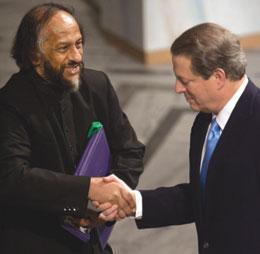Rajendra Pachauri, IPCC, Science and Politics
December 19th, 2007Posted by: Roger Pielke, Jr.
The current issue of Nature has a lengthy profile of Rajendra Pachauri, its “Newsmaker of the Year.” In the profile Dr. Pachauri discusses his personal views on the politics of climate change and his responsibilities as IPCC chair. Here is how he characterizes his own efforts, as quoted in the Nature profile:
We have been so drunk with this desire to produce and consume more and more whatever the cost to the environment that we’re on a totally unsustainable path. I am not going to rest easy until I have articulated in every possible forum the need to bring about major structural changes in economic growth and development.

In recent weeks and months, Dr. Pachauri, and other representatives of the IPCC, have certainly not been shy in advocating specific actions on climate change, using their role as IPCC leaders as a pulpit to advance those agendas. For instance, in a recent interview with CNN on the occasion of representing the IPCC at the Nobel Prize ceremony, Dr. Pachauri downplayed the role of geoengineering as a possible response to climate change, suggested that people eat less meat, called for lifestyle changes, suggested that all the needed technologies to deal with climate change are in the marketplace or soon to be commercialized, endorsed the Kyoto Protocol approach, criticized via allusion U.S. non-participation, and defended the right of developing countries to be exempt from limits on future emissions.
Dr. Pachauri has every right to these personal opinions, but each of the actions called for above are contested by some thoughtful people who believe that climate change is a problem requiring action, and accept the science as reported by the IPCC. These policies are not advocated by the IPCC because the formal mandate of the IPCC is to be “policy neutral.” But with its recent higher profile, it seems that the IPCC leadership believes that it can flout this stance with impunity. The Nature profile discusses this issue:
The IPCC’s mandate is to be ‘neutral with respect to policy’ — to set out the options and let policy-makers decide how to act. The reports themselves reflect this. Every word is checked and double-checked by scientists, reviewers and then government representatives — “sanitized”, as Pachauri puts it. But Pachauri is the face of the IPCC, and he often can’t resist speaking out, despite a few “raps on the knuckles” for his comments. He insists that he always makes it clear he is speaking on his own behalf and not for the IPCC. “It’s one thing to make sure that our reports are sanitized. It’s another for me as an individual to talk about policies that might work. I feel I have responsibility far beyond being a spokesman for the IPCC. If I feel there are certain actions that can help us meet this challenge, I feel I should articulate them.”
“I think Patchy needs to be careful,” says Bert Metz, a senior researcher at the Netherlands Environmental Assessment Agency in Bilthoven, who is one of the co-chairs of the IPCC’s working group on greenhouse-gas mitigation. “One of the things about the IPCC is that it lays down the facts. If you start mixing [that] with your own views that’s not very wise. But he gets away with it because of his charm.” Steve Rayner, director of the James Martin Institute at the University of Oxford, UK, and a senior author with the same working group, feels that Pachauri’s personal statements place too much stress on lifestyles and not enough on technologies. But he also concedes that a certain amount of outspokenness is an essential part of the job. “I don’t think you can provide inspirational leadership in an enterprise like this unless you are passionate. That’s something Bob [Watson] and Patchy have in common. They are both very passionate about the issue and I think that’s appropriate.”
In general, those who agree with the political agenda advanced by Dr. Pachauri will see no problem with his advocacy, and those opposed will find it to be problematic. And this is precisely the problem. By using his platform as a scientific advisor to advance a political agenda, Dr. Pachauri risks politicizing the IPCC and turning it (or perceptions of it) into simply another advocacy group on climate change, threatening its legitimacy and ultimately, its ability to serve as a trusted arbiter of science.
On this point reasonable people will disagree. However, before you decide how you feel about this subject, consider how you would feel if the head of the International Atomic Energy Association responsible for evaluating nuclear weapons programs were to be an outspoken advocate for bombing the very country he was assessing, or if the head of the CIA with responsibility to bring intelligence to policy makers also was at the same time waging a public campaign on certain foreign policies directly related to his intelligence responsibilities. For many people the conflation of providing advice and seeking to achieve political ends would seem to be a dangerous mix for both the quality of advice and the quality of decision making.
The IPCC is riding high these days, but as Burt Metz says, they need to be very careful. Saying that your organization is “policy neutral” while behaving quite differently does not seem to be a sustainable practice. Policy makers will need science advice on climate change for a long time. The IPCC politicizes its efforts with some risk.
December 21st, 2007 at 7:45 pm
Have we overlooked an optical depth climate feedback in the Nobel Peace prize process?
That Mjoes hails from the worlds northernmost,and hence most AGW prone University, Tromso ,at 70 N,
must have affected his views as profoundly as India’s climate of tropical privation has altered Pachauri’s conception of consumerism